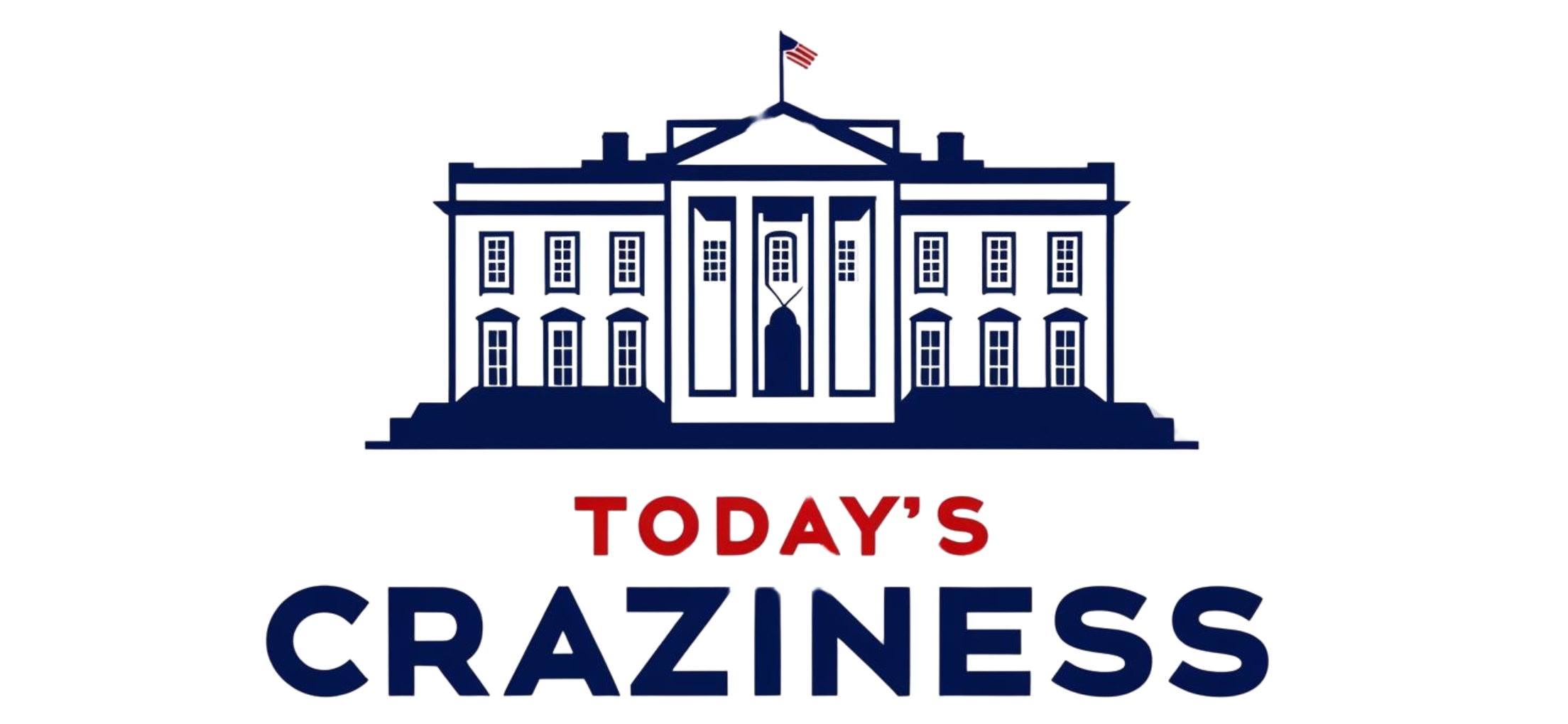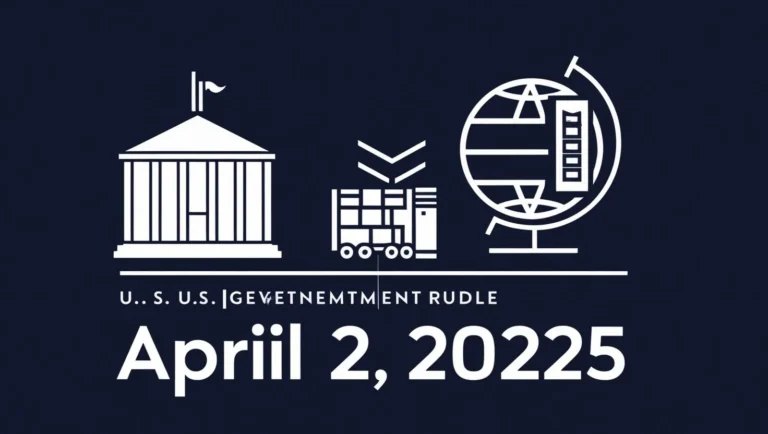Trump escalates U.S. trade tensions with sweeping executive orders targeting China, Venezuela, and the global auto market. The administration reclassifies federal jobs, imposes new tariffs, and dismantles key import exemptions—signaling an aggressive shift in economic and foreign policy. Agencies brace for legal, financial, and diplomatic fallout.
On April 2, 2025, multiple U.S. Executive Departments and the White House made significant policy announcements and strategic decisions, particularly in the areas of trade, national security, and federal employment reforms. President Trump signed several executive orders reshaping America’s international trade posture, federal personnel classifications, and opioid-related enforcement policies, while departments such as HHS, DOJ, and Treasury were also actively involved in restructuring and policy execution.
🏛️ The White House & Executive Office of the President
1️⃣ Policy Changes & Legislative Actions
[1] 🔑 Key Takeaways:
President Trump signed three major executive orders today targeting foreign trade imbalances, eliminating duty-free treatment for Chinese imports, and implementing reciprocal tariffs. These measures represent a sharp pivot toward protectionism with far-reaching implications for international commerce and U.S. consumers.
[2] 📄 Summary:
President Trump declared a national emergency under the International Emergency Economic Powers Act (IEEPA) to address what the administration considers “unfair foreign trade practices.” Accompanying the declaration were executive orders imposing reciprocal tariffs and eliminating de minimis exemptions for low-value imports from China, aimed at curbing the influx of synthetic opioids. The administration argues these moves are necessary to defend national and economic security and reduce trade deficits. These orders are expected to trigger responses from key trading partners and may result in WTO disputes or retaliatory tariffs.
[3] 📜 Bibliography Requirements:
- WhiteHouse.gov | Fact Sheet
- WhiteHouse.gov | Fact Sheet
- WhiteHouse.gov | Presidential Action
Verification: These sources were verified as published on April 2, 2025, Eastern Time (ET).
2️⃣ Leadership Actions & Public Engagements
[1] 🔑 Key Takeaways:
President Trump issued a proclamation recognizing World Autism Awareness Day and reaffirmed the administration’s commitment to investigating the root causes of autism. The statement underlines both public health focus and political positioning.
[2] 📄 Summary:
In a formal proclamation, President Trump marked April 2 as World Autism Awareness Day, calling attention to the rising rates of autism in the United States. The President stated his administration would increase efforts to identify contributing factors and explore new avenues for diagnosis and treatment. This continues an ongoing theme in the administration’s health policy approach, with implications for funding, research institutions, and advocacy groups.
[3] 📜 Bibliography Requirements:
- WhiteHouse.gov | Proclamation
Verification: This source was verified as published on April 2, 2025, Eastern Time (ET).
5️⃣ National Security & Emergency Responses
[1] 🔑 Key Takeaways:
By declaring a national emergency tied to foreign trade practices and targeting opioid-related imports, the White House has connected trade policy directly with national security concerns.
[2] 📄 Summary:
President Trump invoked emergency powers to justify sweeping trade restrictions, citing the economic and security risks posed by ongoing deficits and Chinese trade practices. The linkage between synthetic opioids and de minimis shipments highlights a convergence of trade enforcement with drug policy, particularly concerning shipments from China. These declarations could affect the flow of goods across borders and enhance Customs and Border Protection (CBP) enforcement capabilities.
[3] 📜 Bibliography Requirements:
- WhiteHouse.gov | Fact Sheet
- WhiteHouse.gov | Executive Order
Verification: These sources were verified as published on April 2, 2025, Eastern Time (ET).
6️⃣ Economic & Market Impact
[1] 🔑 Key Takeaways:
The President imposed 25% tariffs on foreign automobiles and parts to promote domestic manufacturing and protect U.S. jobs. This follows similar actions taken in the steel and aluminum industries.
[2] 📄 Summary:
Citing Section 232 of the Trade Expansion Act, President Trump announced tariffs on imported passenger vehicles, light trucks, and select auto parts, effective immediately. The administration argues this will bolster U.S. auto manufacturing and reduce reliance on foreign supply chains. Industry analysts warn of potential price hikes and retaliatory measures by trade partners. This move aligns with previous actions targeting foreign steel and aluminum, forming a broader industrial protection strategy.
[3] 📜 Bibliography Requirements:
- WhiteHouse.gov | Fact Sheet
Verification: This source was verified as published on April 2, 2025, Eastern Time (ET).
7️⃣ Public & Industry Reactions
[1] 🔑 Key Takeaways:
Industry groups and commentators responded to Trump’s trade moves, with steel companies and manufacturing advocates praising the tariffs. Critics warned of higher consumer prices and diplomatic fallout.
[2] 📄 Summary:
Following the announcement of multiple trade-related executive orders, the White House released a summary of support from domestic steel manufacturers and economic advisors. The administration touted the revival of U.S.-based production, citing investment increases and tax incentives. However, concerns remain among retailers and trade partners about long-term costs, compliance complexities, and global market reactions.
[3] 📜 Bibliography Requirements:
- WhiteHouse.gov | Article
Verification: This source was verified as published on April 2, 2025, Eastern Time (ET).
⚖️ Department of Justice (DOJ)
2️⃣ Leadership Actions & Public Engagements
[1] 🔑 Key Takeaways:
A former Trump-affiliated attorney has been appointed to a senior position within the DOJ, raising questions about politicization and internal priorities.
[2] 📄 Summary:
President Trump appointed a lawyer who previously defended several of his top aides during criminal investigations to a senior role within the DOJ. Critics argue the appointment signals a continued reshaping of the Department’s upper ranks, potentially prioritizing political loyalty over independence. Supporters claim it ensures alignment with the administration’s law-and-order agenda. The move may influence ongoing prosecutorial strategies and internal oversight mechanisms.
[3] 📜 Bibliography Requirements:
- Reuters | Article
Verification: This source was verified as published on April 2, 2025, Eastern Time (ET).
🧬 Department of Health and Human Services (HHS)
3️⃣ New Initiatives & Departmental Programs
[1] 🔑 Key Takeaways:
HHS leadership is preparing to brief Congress on significant restructuring and layoffs across multiple sub-agencies, raising concerns about public health preparedness.
[2] 📄 Summary:
After executing a major workforce reduction across CDC, NIH, and other health agencies, HHS officials are scheduled to appear before the House Energy and Commerce Committee. Democrats have called for an emergency hearing to understand how these changes might affect national health strategy and pandemic readiness. The layoffs, described by the administration as “efficiency measures,” are part of broader administrative reforms. Lawmakers from both parties have demanded transparency regarding the rationale and potential consequences.
[3] 📜 Bibliography Requirements:
- Politico | Article
Verification: This source was verified as published on April 2, 2025, Eastern Time (ET).
💰 Department of the Treasury
1️⃣ Policy Changes & Legislative Actions
[1] 🔑 Key Takeaways:
The Treasury will be instrumental in implementing President Trump’s reciprocal tariff orders and new enforcement directives targeting countries importing Venezuelan oil. These changes may require updated tariff classifications, financial compliance guidance, and coordination with Customs and Border Protection (CBP).
[2] 📄 Summary:
As part of today’s executive orders, the President directed agencies—implicitly including the Treasury Department—to begin enforcing new tariff policies targeting imported automobiles and products from Venezuela-linked economies. Treasury’s Office of Foreign Assets Control (OFAC) is expected to play a key role in sanction enforcement and tariff structuring related to these measures. The imposition of a 25% tariff on goods from countries continuing to import Venezuelan oil adds another layer of financial oversight, particularly given the country’s involvement in evading international sanctions. These steps reinforce the Trump administration’s stated goal of using financial tools for geopolitical leverage.
[3] 📜 Bibliography Requirements:
- WhiteHouse.gov | Executive Order on Venezuela
- WhiteHouse.gov | Reciprocal Tariffs EO
Verification: These sources were verified as published on April 2, 2025, Eastern Time (ET).
6️⃣ Economic & Market Impact
[1] 🔑 Key Takeaways:
The Treasury Department will monitor potential macroeconomic fallout and inflationary pressures resulting from today’s sweeping tariff adjustments, particularly on autos and foreign goods tied to adversarial economies.
[2] 📄 Summary:
Tariff announcements affecting key imports will likely lead the Treasury to revise economic forecasts, monitor inflation trends, and assess financial market reactions. These duties—particularly those impacting vehicle imports and goods from China—could prompt cost-push inflation and shift consumer behavior. Treasury Secretary leadership may need to communicate stability measures or collaborate with the Federal Reserve if inflationary trends accelerate. The potential geopolitical backlash could also affect currency markets and Treasury bond dynamics.
[3] 📜 Bibliography Requirements:
- WhiteHouse.gov | Autos Tariff Order
Verification: This source was verified as published on April 2, 2025, Eastern Time (ET).
🌐 Department of State
8️⃣ International Relations & Global Policy Engagements
[1] 🔑 Key Takeaways:
The State Department will now be required to manage fallout from multiple trade-related actions, including reciprocal tariffs, penalties for Venezuelan oil importers, and the rollback of de minimis exemptions — all of which risk destabilizing diplomatic relationships with China, the EU, and Latin American nations.
[2] 📄 Summary:
Today’s executive orders have far-reaching foreign policy implications, and the State Department will likely enter discussions with impacted trade partners. China is expected to respond sharply to the de minimis exemption elimination and new tariff structures, which directly target low-cost e-commerce shipments. Additionally, the move to sanction countries continuing to trade with Venezuela escalates a regional pressure campaign. The State Department will need to mitigate diplomatic friction, manage trade negotiations, and potentially prepare for bilateral retaliation. These moves represent an aggressive “America First” realignment of U.S. foreign trade posture and economic diplomacy.
[3] 📜 Bibliography Requirements:
- WhiteHouse.gov | EO on China Tariffs
- WhiteHouse.gov | Venezuela Tariff EO
Verification: These sources were verified as published on April 2, 2025, Eastern Time (ET).
📜 Bibliography Requirements with Timestamps & Verification
- President Declares Trade Emergency
📅 April 2, 2025
🔗 https://www.whitehouse.gov/fact-sheets/2025/04/fact-sheet-president-donald-j-trump-declares-national-emergency-to-increase-our-competitive-edge-protect-our-sovereignty-and-strengthen-our-national-and-economic-security/ - Ends De Minimis Imports From China
📅 April 2, 2025
🔗 https://www.whitehouse.gov/fact-sheets/2025/04/fact-sheet-president-donald-j-trump-closes-de-minimis-exemptions-to-combat-chinas-role-in-americas-synthetic-opioid-crisis/ - Imposes Reciprocal Tariffs on Trade Deficits
📅 April 2, 2025
🔗 https://www.whitehouse.gov/presidential-actions/2025/04/regulating-imports-with-a-reciprocal-tariff-to-rectify-trade-practices-that-contribute-to-large-and-persistent-annual-united-states-goods-trade-deficits/ - Steel and Auto Tariffs Draw Praise
📅 April 2, 2025
🔗 https://www.whitehouse.gov/articles/2025/04/president-trumps-bold-trade-action-draws-praise/ - Auto Tariff Policy Announcement
📅 April 2, 2025
🔗 https://www.whitehouse.gov/fact-sheets/2025/03/fact-sheet-president-donald-j-trump-adjusts-imports-of-automobiles-and-automobile-parts-into-the-united-states/ - Trump Targets Venezuelan Oil Trade
📅 April 2, 2025
🔗 https://www.whitehouse.gov/presidential-actions/2025/03/imposing-tariffs-on-countries-importing-venezuelan-oil/ - World Autism Awareness Day Proclamation
📅 April 2, 2025
🔗 https://www.whitehouse.gov/presidential-actions/2025/04/world-autism-awareness-day-2025/ - HHS Restructuring Prompts House Briefing
📅 April 2, 2025
🔗 https://www.politico.com/live-updates/2025/04/02/congress/energy-and-commerce-democrats-call-for-hearing-with-rfk-jr-after-major-hhs-layoffs-00267100 - GOP Senate Budget Proposal
📅 April 2, 2025
🔗 https://www.politico.com/live-updates/2025/04/02/congress/senate-republicans-unveil-retooled-budget-blueprint-00266944 - Trump DOJ Appointment Sparks Scrutiny
📅 April 2, 2025
🔗 https://www.reuters.com/world/us/trump-taps-lawyer-top-aides-senior-justice-department-official-2025-04-02/ - Trump Reclassifies Federal Employees
📅 April 2, 2025
🔗 https://www.reuters.com/world/us/trump-administration-moves-more-easily-fire-some-agency-employees-2025-04-02/ - Trump Continues Pressure on Venezuela
📅 April 2, 2025
🔗 https://www.politico.com/newsletters/national-security-daily/2025/04/02/trump-sticks-to-maximum-pressure-on-venezuela-for-now-00267324
✅ Verification Statement:
These sources were verified as published on April 2, 2025, Eastern Time (ET).



